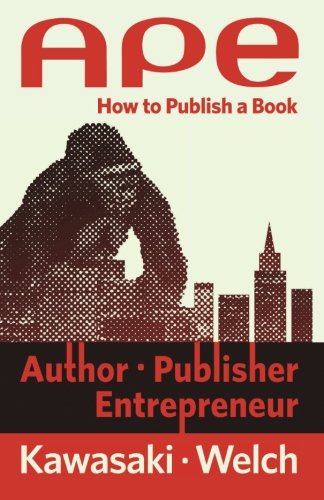 WRITERS. This week, I listened to a free educational webinar on self-publishing hosted by Ed Gandia of the International Freelancers Academy. Entitled “APE: A Proven Roadmap for Self-Publishing,” the webinar was presented by NY Times best-selling author and tech-industry guru Guy Kawasaki. It covered key points from the book Kawasaki co-authored with Shawn Welch: “APE: Author, Publisher, Entrepreneur: How to Publish a Book.”
WRITERS. This week, I listened to a free educational webinar on self-publishing hosted by Ed Gandia of the International Freelancers Academy. Entitled “APE: A Proven Roadmap for Self-Publishing,” the webinar was presented by NY Times best-selling author and tech-industry guru Guy Kawasaki. It covered key points from the book Kawasaki co-authored with Shawn Welch: “APE: Author, Publisher, Entrepreneur: How to Publish a Book.”
I tuned into this webinar because I had read (and admired!) two of Kawasaki’s previous books. In “The Art of Start,” Kawasaki explains how entrepreneurs plan, pitch, bootstrap and brand new businesses. In “Enchantment: The Art of Changing Minds, Hearts, and Actions,” he contends that in order to achieve a desired outcome, your likability and trustworthiness can be more effective than traditional persuasion or marketing techniques.
In the webinar, Guy explained why he chose to try self-publishing when he wrote about book about Google+ and what lessons he learned in the process. Kawasaki discussed the pros and cons of self-publishing, some essential productivity tools, and ideas for efficiently “tapping the crowd” for help with developmental editing. He strongly recommended hiring a copy editor for the final manuscript and a professional cover designer.
I just downloaded the book to my Kindle this morning, but here are some key points that struck me during the webinar.
These guys have credibility! This webinar wasn’t produced by a publishing company that sells consulting, conversion, or publicity services to aspiring authors. Rather, it was a dialogue between two writers who have personally experienced the slow, bureaucratic pace of traditional publishing.
Thus, they seemed excited about being able to control their own publishing fates. Kawasaki pointed out that self-published authors maintain control of the content and look of the book and how it is marketed, receive a greater percentage of the revenues, and retain all rights. Plus, the time-to-market is much shorter.
A successful self-publisher must play three roles: Author/Publisher/Entrepreneur (APE). The book’s cover design suggests that APEs are about to wreak havoc on the New York publishing scene.
Self-publishing is like starting a new business. As Kawasaki writes, “Entrepreneurs must create a product, test it, raise money, recruit talent, and find customers at the same time.” In the webinar and book, he explains ways authors can test their work, raise money, hire talent, and start marketing their book soon after they commit to their idea.
Writers should not view self-publishing as a second-rate option. Kawasaki suggests using the term “artisanal publishing” as a way of taking more pride in the process. He likens it to producing small quantities of a high-quality craft beer or fine wine. Like starting an independent restaurant or artisanal bakery, you have control over the quality of the finished product.
Focus on publishing a great book. Some marketing-focused webinars suggest self-publishing books primarily as way to attract new clients, increase speaking opportunities, and build your personal brand. Kawasaki urged webinar attendees to publish books for the right reasons:
- to enrich people’s lives
- to further a cause
- to meet an intellectual challenge.
He said that if you focus first on producing an excellent book, the secondary benefits will follow.
Listen to the webinar in its entirety on the website of the International Freelancers Academy. If you are seeking some real-world, no-nonsense straight talk about self-publishing a book, I highly recommend it.
LINKS
About the International Freelancers Academy
